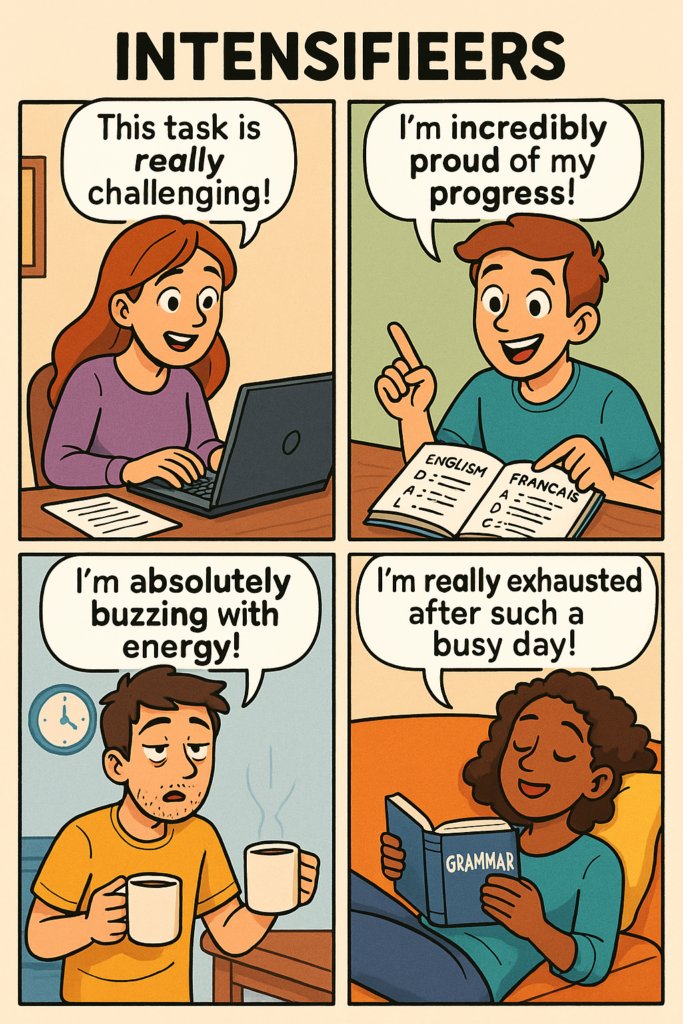In this lesson, we will explore intensifiers—words or phrases that are used to make adjectives, verbs, or other adverbs stronger. By the end of this lesson, you’ll be able to use intensifiers naturally in your conversations and writing.

What Are Intensifiers?
Intensifiers are words that amplify or strengthen the meaning of other words. They are commonly used in English to add emphasis to descriptions, actions, or feelings.
For example:
- “She is very smart.”
- “He runs extremely fast.”
In these sentences, very and extremely are intensifiers. Without them, the descriptions would feel weaker.
Common Intensifiers
Here’s a list of some common intensifiers in English:
| Intensifier | Example Sentence |
|---|---|
| Very | The movie was very interesting. |
| Extremely | It was extremely hot yesterday. |
| Really | I’m really tired after work. |
| So | The cake was so delicious! |
| Too | The coffee was too sweet for me. |
| Quite | She’s quite intelligent. |
| Absolutely | This pizza is absolutely amazing! |
| Incredibly | The view from the top was incredibly beautiful. |
How to Use Intensifiers
1. With Adjectives
Intensifiers are often used with adjectives to emphasize qualities or characteristics.
Examples:
- The weather is extremely cold today.
- That painting is absolutely stunning.
2. With Adverbs
You can also use intensifiers with adverbs to emphasize how something is done.
Examples:
- She sings so beautifully.
- He runs incredibly fast.
3. With Verbs
Sometimes, intensifiers are used directly with verbs to show intensity.
Examples:
- I really enjoyed the concert.
- They absolutely adore their new puppy.
Differences Between Similar Intensifiers
Some intensifiers may seem similar, but they have subtle differences in usage. Let’s compare:
| Intensifier | Meaning | Example |
|---|---|---|
| Very | Adds emphasis, but not as strong as “extremely.” | She’s very talented. |
| Extremely | Much stronger than “very.” | She’s extremely talented. |
| Really | Informal; used in casual conversation. | I’m really excited about the trip. |
| Too | Implies something is more than necessary or desirable. | The soup is too salty. |
| Quite | Can mean “fairly” (British English) or “completely” (American English). | It’s quite impressive. |
Tips for Using Intensifiers
- Avoid overusing intensifiers like very or really. Instead, try stronger alternatives like extremely, absolutely, or incredibly.
- Be mindful of context. Some intensifiers, like too, can have negative connotations.
- Use quite carefully, as its meaning can vary depending on whether you’re speaking British or American English.
Summary
Intensifiers are powerful tools in English that help you express emotions, opinions, and descriptions more vividly. By mastering intensifiers, you can sound more natural and fluent in your conversations.
Key takeaways:
- Intensifiers amplify adjectives, adverbs, and verbs.
- Common intensifiers include very, extremely, really, so, and too.
- Pay attention to subtle differences between intensifiers to use them correctly.
Now it’s your turn! Try using intensifiers in your daily conversations or writing. Practice makes perfect!